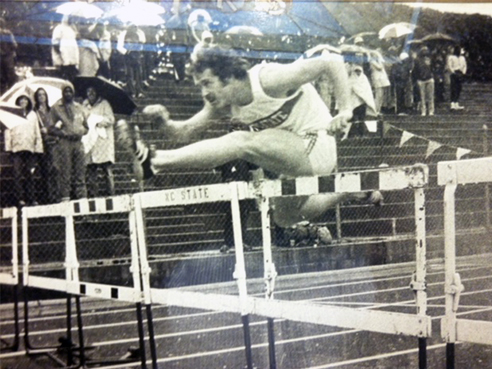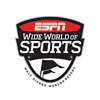AAU First Vice President Rusty Buchanan Reflects on Olympic Dream
03/21/2018
Rusty Buchanan is living his Olympic dream. Through unwavering persistence and passionate dedication to amateur sports, Buchanan has achieved his Olympic dream – though perhaps not the way he would have expected.
Rusty Buchanan is living his Olympic dream.
In the mid-1970s, Buchanan, one of the most successful hurdlers in North America, fell just short of his ultimate goal of competing for Team USA on the grandest stage. A string of bad luck, including the U.S. boycott in 1980 and an injured knee that ended his career, kept Buchanan out of the Games as an athlete.
But, through unwavering persistence and passionate dedication to amateur sports, Buchanan has achieved his Olympic dream – perhaps not the way he would have expected.
“I have always been a half-step off,” Buchanan said. “Now, I’m right in the middle of it.”
It was February 27, 2010. Buchanan, AAU First Vice President, stood with decorated U.S. bobsledder Steve Holcomb at Whistler Medals Plaza in Vancouver. Holcomb and his teammates Justin Olsen, Steve Mesler and Curt Tomasevicz had just received their gold medals after sliding to a four-man bobsled crown earlier that day, ending a 62-year gold medal drought for the United States in that event.
Holcomb, perhaps the most notable American to ever compete in the sport, would go on to earn a bronze medal in both the two-man and four-man bobsled in the 2014 Games in Sochi. He and brakeman Steve Langton ended yet another 62-year American drought in the Olympic two-man competition. Tomasevicz earned another bronze medal in 2014 and Olsen has an opportunity to medal in this year’s competition.
And there was Buchanan, a former track star with the dream of competing for his country, snuggled into his grey bubble coat with Team USA and the five Olympic rings emblazoned across his heart.
“This is pretty cool,” Buchanan thought at the time. “I feel like I’m a part of something.”
It has been nearly 30 years and Buchanan can still recite, almost word for word, the statement from President Jimmy Carter:
I can’t say at this moment what other nations will not go to the Summer Olympics in Moscow. Ours will not go. I say that not with any equivocation; the decision has been made.
Buchanan had trained his entire life for an opportunity to compete for the United States in the Olympic Games. He was an accomplished hurdler at North Carolina State who ran toe-to-toe with some of the most successful athletes in the sport. He ran toe-to-toe with the likes of Renaldo Nehemiah, Charlie Roberson, Edwin Moses and Mike Shine on a regular basis.
It was a competitive time to specialize in hurdles.
“I remember all these guys coming in and thinking ‘Where are all these hurdlers coming from?” Buchanan said. “And they were all racing against me just about every race.”
Prior to the 1980 Olympic Trials, Buchanan added the decathlon to his repertoire of events. Training alongside future Olympian John Crist as assistant coaches at North Carolina State, Buchanan was on pace to qualify – and even challenge – Crist at the Trials.
“Making the team was an option but I needed to run an extraordinary race,” Buchanan said.
President Carter’s announcement came at a most inopportune time. Years of training and preparation were for naught and many athletes, including Buchanan, missed possibly their greatest opportunity to fulfill their lifelong dream of being an Olympian.
It was February 2012. There was a record snowfall in Kabul, Afghanistan. Temperatures were below freezing and more than 150 youth athletes – 75 boys and 75 girls – were waiting on the campus of Ghazi Olympic Stadium.
At the request of Lieutenant General Zahir Aghbar, head of the Afghan National Olympic Committee, Buchanan, led by then-Vice President of Sports Operations James Parker, was sent on a diplomatic mission to Afghanistan with Navy Rear Admiral Hal Pittman, the ISAF Deputy Chief of Staff for Communications.
Buchanan and other AAU volunteers conducted four days of intensive training in sports administration and sports coaching. They worked with coaches and sports administrators from 34 provinces in Afghanistan to emphasize the use of sports to empower communities.
“Sports crosses all boundaries and can lay common ground for a basis for the future,” Buchanan said. “That was the plan in Afghanistan – a diplomatic sports mission in a country that, for many has only known war, to offer a sliver of peace through sport.”
As ordered by General David Petraeus, the trip served as an opportunity for AAU volunteers to help Afghan coaches develop community-based sports programs for youth athletes. It was an opportunity for Buchanan to help make sport participation – and perhaps even the Olympics – a possibility for children who, at the time, only knew war.
It was Summer 1996. Buchanan’s Olympic dream had faded – he blew out his knee training for the decathlon on Thanksgiving Day in 1983 – and he had established himself as one of the foremost leaders in the sports industry.
While working with Adidas in 1984, Buchanan was charged with helping Atlanta Mayor Andrew Young to establish a training site for African athletes, including Zimbabwe sprinter Tapfumaneyi Jonga, leading up to the Olympic Games in Los Angeles. In 1990, he organized the longest torch run in the history of the AAU Junior Olympic Games as part of President George H.W. Bush’s Thousand Points of Light program.
Buchanan was making a name for himself as an organizer of amateur sports events, but he never lost contact with the Olympic movement. His famed torch run caught the attention of the U.S. Olympic Committee, so much so that Buchanan was tasked with assembling the torch run leading up to Olympic Games in Atlanta.
“The torch run signifies that sports competition is near and it is time to put differences aside and focus on a rivalry through sport competition,” Buchanan said. “The run itself was awesome because it touched so many people in all walks of life.”
In recognition of his efforts, Buchanan carried the torch – the same torch that eventually made its way to Muhammad Ali in the Olympic Centennial Stadium – through his hometown of Cocoa Beach and handed it off to Cocoa Beach astronaut Mike McCauley.
-----------------------------------------------
Nearly four decades have passed since President Carter’s influential speech.
Buchanan never topped an Olympic hurdle or walked in an opening ceremony. He never dawned that Olympic gold medal many athletes dream of as kids.
But he is an Olympian – and he’s got his pewter Olympic participation medal from the 2010 Olympic Games in Vancouver to prove it.
Buchanan now sits on the Board of Directors for the USA Bobsled and Skeleton Foundation. He attended his third consecutive Olympic Games last month in Pyeongchang, South Korea, where he dawned his red, white and blue in support of Team USA.
Forty years later, Buchanan is living his dream.
“Don’t ever give up on your dreams. You never know what means you’ll achieve them through,” Buchanan said.
In the mid-1970s, Buchanan, one of the most successful hurdlers in North America, fell just short of his ultimate goal of competing for Team USA on the grandest stage. A string of bad luck, including the U.S. boycott in 1980 and an injured knee that ended his career, kept Buchanan out of the Games as an athlete.
But, through unwavering persistence and passionate dedication to amateur sports, Buchanan has achieved his Olympic dream – perhaps not the way he would have expected.
“I have always been a half-step off,” Buchanan said. “Now, I’m right in the middle of it.”
It was February 27, 2010. Buchanan, AAU First Vice President, stood with decorated U.S. bobsledder Steve Holcomb at Whistler Medals Plaza in Vancouver. Holcomb and his teammates Justin Olsen, Steve Mesler and Curt Tomasevicz had just received their gold medals after sliding to a four-man bobsled crown earlier that day, ending a 62-year gold medal drought for the United States in that event.
Holcomb, perhaps the most notable American to ever compete in the sport, would go on to earn a bronze medal in both the two-man and four-man bobsled in the 2014 Games in Sochi. He and brakeman Steve Langton ended yet another 62-year American drought in the Olympic two-man competition. Tomasevicz earned another bronze medal in 2014 and Olsen has an opportunity to medal in this year’s competition.
And there was Buchanan, a former track star with the dream of competing for his country, snuggled into his grey bubble coat with Team USA and the five Olympic rings emblazoned across his heart.
“This is pretty cool,” Buchanan thought at the time. “I feel like I’m a part of something.”
It has been nearly 30 years and Buchanan can still recite, almost word for word, the statement from President Jimmy Carter:
I can’t say at this moment what other nations will not go to the Summer Olympics in Moscow. Ours will not go. I say that not with any equivocation; the decision has been made.
Buchanan had trained his entire life for an opportunity to compete for the United States in the Olympic Games. He was an accomplished hurdler at North Carolina State who ran toe-to-toe with some of the most successful athletes in the sport. He ran toe-to-toe with the likes of Renaldo Nehemiah, Charlie Roberson, Edwin Moses and Mike Shine on a regular basis.
It was a competitive time to specialize in hurdles.
“I remember all these guys coming in and thinking ‘Where are all these hurdlers coming from?” Buchanan said. “And they were all racing against me just about every race.”
Prior to the 1980 Olympic Trials, Buchanan added the decathlon to his repertoire of events. Training alongside future Olympian John Crist as assistant coaches at North Carolina State, Buchanan was on pace to qualify – and even challenge – Crist at the Trials.
“Making the team was an option but I needed to run an extraordinary race,” Buchanan said.
President Carter’s announcement came at a most inopportune time. Years of training and preparation were for naught and many athletes, including Buchanan, missed possibly their greatest opportunity to fulfill their lifelong dream of being an Olympian.
It was February 2012. There was a record snowfall in Kabul, Afghanistan. Temperatures were below freezing and more than 150 youth athletes – 75 boys and 75 girls – were waiting on the campus of Ghazi Olympic Stadium.
At the request of Lieutenant General Zahir Aghbar, head of the Afghan National Olympic Committee, Buchanan, led by then-Vice President of Sports Operations James Parker, was sent on a diplomatic mission to Afghanistan with Navy Rear Admiral Hal Pittman, the ISAF Deputy Chief of Staff for Communications.
Buchanan and other AAU volunteers conducted four days of intensive training in sports administration and sports coaching. They worked with coaches and sports administrators from 34 provinces in Afghanistan to emphasize the use of sports to empower communities.
“Sports crosses all boundaries and can lay common ground for a basis for the future,” Buchanan said. “That was the plan in Afghanistan – a diplomatic sports mission in a country that, for many has only known war, to offer a sliver of peace through sport.”
As ordered by General David Petraeus, the trip served as an opportunity for AAU volunteers to help Afghan coaches develop community-based sports programs for youth athletes. It was an opportunity for Buchanan to help make sport participation – and perhaps even the Olympics – a possibility for children who, at the time, only knew war.
It was Summer 1996. Buchanan’s Olympic dream had faded – he blew out his knee training for the decathlon on Thanksgiving Day in 1983 – and he had established himself as one of the foremost leaders in the sports industry.
While working with Adidas in 1984, Buchanan was charged with helping Atlanta Mayor Andrew Young to establish a training site for African athletes, including Zimbabwe sprinter Tapfumaneyi Jonga, leading up to the Olympic Games in Los Angeles. In 1990, he organized the longest torch run in the history of the AAU Junior Olympic Games as part of President George H.W. Bush’s Thousand Points of Light program.
Buchanan was making a name for himself as an organizer of amateur sports events, but he never lost contact with the Olympic movement. His famed torch run caught the attention of the U.S. Olympic Committee, so much so that Buchanan was tasked with assembling the torch run leading up to Olympic Games in Atlanta.
“The torch run signifies that sports competition is near and it is time to put differences aside and focus on a rivalry through sport competition,” Buchanan said. “The run itself was awesome because it touched so many people in all walks of life.”
In recognition of his efforts, Buchanan carried the torch – the same torch that eventually made its way to Muhammad Ali in the Olympic Centennial Stadium – through his hometown of Cocoa Beach and handed it off to Cocoa Beach astronaut Mike McCauley.
-----------------------------------------------
Nearly four decades have passed since President Carter’s influential speech.
Buchanan never topped an Olympic hurdle or walked in an opening ceremony. He never dawned that Olympic gold medal many athletes dream of as kids.
But he is an Olympian – and he’s got his pewter Olympic participation medal from the 2010 Olympic Games in Vancouver to prove it.
Buchanan now sits on the Board of Directors for the USA Bobsled and Skeleton Foundation. He attended his third consecutive Olympic Games last month in Pyeongchang, South Korea, where he dawned his red, white and blue in support of Team USA.
Forty years later, Buchanan is living his dream.
“Don’t ever give up on your dreams. You never know what means you’ll achieve them through,” Buchanan said.
 Email
Email Print
Print









